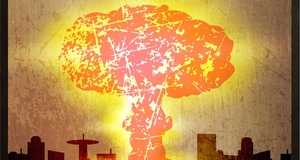Student VoicesViewing Four Vonnegut Novels Through the Lens of Literary Criticism
By
2009, Vol. 1 No. 11 | pg. 1/1
KEYWORDS:
I like Kurt Vonnegut because he’s innovative and unique, his literary voice speaking out of a time period I love, when he “was actually helping to breathe life into a new genre—modern, pop fiction,”1 according to critic Tom Verde. Even though he himself isn’t a radical, and in fact most of his beliefs (according to him) stem from a childhood spent during the Great Depression, the unrest of the sixties and seventies allowed him not only liberation in what he could write about—science in an age of dizzying technological advancement; religion, sex, and tradition in an age of cultural upheaval; socialism and pacifism in an age of peace rallies—but also a stylistic freedom. And for this reason, I had until now ignored the opinions of experts. I was afraid I’d find lots of stiff, crusty old critics bemoaning the death of the narrative and cursing Vonnegut for contributing to the degeneration of humanity (he would agree, with characteristic self-deprecation), crying out for Austen and Hawthorne and other authors that put me to sleep, and otherwise doing their best to ruin my reading experience. Underlying all Vonnegut’s fiction is humanism. Most of the critics agreed that the most important aspect of Vonnegut’s writing is a belief in “human dignity”—a term I found in three different critical essays. Breakfast of Champions explores the idea of human beings as pure machinery, each doing what it is programmed to do, claiming no self-respect or dignity, and that the truest examples of this idea are the American poor: those people who are trapped in the mechanical monotony of making ends meet.In our culture, these people are often thought to be undeserving of respect, and Vonnegut is disgusted by that attitude, writes Jerome Klinkowitz: “The key solution to human problems, Vonnegut kept insisting, is to find human dignity for all human beings—even those who seem to least deserve it.”2 He goes on to explain that Vonnegut believes that dignity isn’t an exclusive privilege for the well-to-do or successful, but is intrinsic to simply being a person.3 This concept is easily applicable to the destitute island people of San Lorenzo in Cat’s Cradle and to the soldiers in Slaughterhouse-Five. In the latter, the suffocating, constant mood experienced by Billy Pilgrim and the other soldiers—who were, as is usually the case, mostly young and poor—demonstrates the inevitability of impending death, as though they were easily dispensable tools of war; if they died, who would care? They were, after all, just machines. Critic Peter J. Reed writes that Vonnegut knows that to conquer this problem requires a basic realization of the importance of every individual, an act of conscience “[entailing] a recognition of the peculiar identity, the uniqueness, the ‘sacredness’ of that being.”4 Because of their circumstances, the characters in Slaughterhouse-Five essentially give up on the world, surrendering their free will to fate, an act described by critic Conrad Festa as “beneath the dignity of man.”5 In the same breath as human dignity, one must talk about human responsibility—and most of the critics I found mentioned something about Vonnegut’s characters’ tendency to draw inward to evade responsibility; Conrad Festa wrote that “man’s inclination to avoid painful reality” is “the central object of satire”6 in Vonnegut’s writing. In Slaughterhouse-Five, Billy Pilgrim, after being told by the eerie, unlikable aliens from planet Tralfamadore that all events are permanent, unchanging, and inevitable, is overwhelmed by apathy and detachment mirrored by the tone of the narration and intended to frustrate the reader. However, I failed to mention the use of the phrase “So it goes”: an effective device, Festa explains, because “the frequency of its repetition and its use to explain every death…finally creates in us a rising fury at its utter banality and meaninglessness.” 7 Vonnegut is therefore appealing to the reader’s conscience; the effectiveness of Breakfast of Champions, for example, is steeped in methods of ethos. Festa goes on to describe Slaughterhouse-Five as an attack on the response of retreating into personal fantasy worlds in attempt to ignore “life’s pain, dangers, and problems.”8 This theme is also inextricably linked to both Cat’s Cradle and Breakfast of Champions, although I didn’t find any critics that directly did so. The nuclear physicist Felix Hoenikker in Cat’s Cradle is assailed by Vonnegut for producing explosive scientific advancements, while totally ignoring the human consequences and responsibility of his actions. And in Breakfast of Champions, characters are so oblivious to one another that the story itself is alienating and reads almost like a cold un-invitation, even after Vonnegut inserts himself into the story—an action Peter Reed claims makes us “feel excluded.”9 I disagree, however, that this is detrimental; actually, I think it is appropriate to the message for the reader to feel alienated. Critic Tom Verde notes “the themes of loneliness and separation in contemporary society” make for a “dark” and “gloomy” novel.10 Overall and extensive critical consensus makes it safe to assert that one of Vonnegut’s major purposes in writing is to express an absolute belief in personal responsibility to care what happens to oneself, and moral responsibility to care what happens to others and to humanity as a whole. Yet, some critics are, apparently, totally oblivious to the irony of Vonnegut’s isolated characters. According to one internet source, Slaughterhouse-Five is sometimes criticized for its “apparent endorsement of passive acceptance as an appropriate response to evil,”11 when actually that is exactly what the book desperately warns against. This misinterpretation is possibly due to what many critics see as a certain level of ambiguity in Vonnegut’s writing, causing some to doubt his title as an effective satirist and others to try to defend it. Much of the critical opinion I found concerning ambiguity seemed to find it essential to understanding Vonnegut. Festa expressed the opinion that his writing often “fails to satisfy certain expectations of consistency of idea, and…fails to yield a comprehensive unambiguous interpretation.”12 He’s right, but I disagree with the use of the term “fails.” I don’t find the ambiguity in the books I’ve read confusing, but instead both appealing and effective. One issue that can be consistently mistaken for ambiguity is Vonnegut’s view on religion and technology. Since he is opposed to those who ignore reality, and since he is a self-proclaimed agnostic, it would seem to follow that he would scorn religion—and that to do otherwise would be a gross contradiction. But he doesn’t scorn religion; Reed claims in “Vonnegut in Academe” that no one familiar with Vonnegut’s fiction would ever call him irreligious. The confusion that he often meets here can actually be easily smoothed away. “If he is anything,” writes Conrad Festa, “he is an activist interested in the specific good that can be done and impatient with all abstractions, including…dogma of any kind.”13 He is first a humanist, and opposes religion should it block the path to human dignity; however, if a public consciously chooses to be deluded by a compassionate religion, one that emphasizes the importance of human connection and self-worth, then it is a good thing because it contributes to the collective happiness (a socialistic belief that at one time, according to the literary analyst Donald Fiene, made Vonnegut popular in the Soviet Union14). Sometimes harmless lies are necessary to achieve a peace of mind that would be otherwise impossible: Jerome Klinkowitz writes, “Middle class superstitions are ultimately democratic, and so Vonnegut finds them useful for his plan to salvage human life at a time when it threatens to become unlivable.”15 This idea is expressed most clearly in Cat’s Cradle through Bokononism, the invented religion whose simultaneous recognition of its own absurdity and contradictions and its capacity for simple, beautiful truths about love and selflessness are designed to comfort its poor, miserable islander followers. Through Bokononism Vonnegut rejects, in the words of Festa, “evils in our society which make life unnecessarily painful, dangerous, and destructive.” 16 These evils can include technology and science, if they produce harmful results: from atom bombs, to ice-nine, to dull, mindless factory jobs. Vonnegut fears that the collision of explosive science with human stupidity—a historically proven constant—will lead to all sorts of complicated, ultimately nonsensical justifications, or “the human ability to willfully neglect simple, available knowledge to maintain insane ideas and attitudes,” according to Festa.17 Vonnegut’s sad fascination with the role of machines in our lives got him landed, for a long time, with the label of science-fiction writer. He was never happy in that compartment, complaining that “so many serious critics regularly mistake [it] for a urinal.” Even now, after he “has done everything possible to disassociate himself from science fiction as a genre,” according to Willis E. McNelly18, residue remains. Apparently Vonnegut’s role as an SF writer is a major topic of discussion. Vonnegut himself actually has a peculiar reverence for SF, as expressed through characters such as the SF writer Kilgore Trout (arguably Vonnegut’s alter ego) and Eliot Rosewater in Slaughterhouse-Five, who talks about the possibility that SF allows (as with most forms of unreality) to step away from ourselves, to remove ourselves from the present, to see ourselves from a different angle—in order to understand the world better, McNelly explains.19 So Vonnegut borrows its methods to express opinions about “General Electric and the loss of human dignity; loss of faith in government; loss of faith in God; loss of faith in the innocence of science…”20 But Vonnegut’s writing is still too people-centric to be called science fiction, as Tom Verde writes, “no matter how much technology figures in his books, his focus remains humanistic.”21 And so, back at humanism, I’ve come full circle. The question, among critics at least, seems to be: what does Vonnegut think of his own humanistic goals? Is he a doomsday writer or a reformer? The suicide of Bokonon at the end of Cat’s Cradle could be seen as the cynical action of a lifelong humanist gone sour, and Conrad Festa would seem to support this, as he expresses doubt about Vonnegut’s hopefulness of change, since “even when reform does happen in his novels, it is soon corrupted.”22 It’s true, but I think it is less a sign of pessimism than a tool of irony, creating awareness, warning that folly can even get in the way of good intentions. Jerome Klinkowitz claims, “Vonnegut’s vision seems to be a through going pessimistic one”—but no; I wrote in my paper about Breakfast of Champions that he is worse than a pessimist, that he is an eternal optimist doomed to disappointment—“resembling either a mordant existentialism, revisited”—but he is too socialistic, too humanistic to be called existential, except in the sense that he thinks the future rests entirely on the shoulders of people—“or black humor which may or may not indicate a belief in a small-‘g’ god, whose name may be, at best, random chance.”23 This is probably closest to the truth. The terrible hilarity of our situation is that we’re stuck. No one has ever stepped in to save us, or will ever step in to save us, and we are essentially alone, except for each other. Acknowledging this isn’t the important thing. The important thing is instead that we acknowledge that other people are all we will know while we’re on Earth. Despite a history of stupidity, humans must depend on each other. Vonnegut, Festa writes, gives us “hope, not despair—but not hope without action.”24 This statement is true, so far, of the books I’ve read, but I can’t say for sure, since there are so many I haven’t read. Even the critics, though, who have read them all, don’t know for sure. Somebody could ask the author, and somebody probably has—but it is doubtful, I think, that even he knows. Endnotes1.) Verde, Tom. Twentieth-Century Writers: 1950-1990. New York, NY: Facts on File, Inc., 1996. 95. 2.) Klinkowitz, Jerome. "Vonnegut in America." Vonnegut in America. Ed. Jerome Klinkowitz and Donald L. Lawler. New York, NY: Dell Co., Inc, 1977. 31. 3.) Ibid 4.) Reed, Peter J. "The Later Vonnegut." Vonnegut in America. Ed. Jerome Klinkowitz and Donald L. Lawler. New York, NY: Dell Co., Inc, 1977. 165. 5.) Festa, Conrad. "Vonnegut’s Satire.” Vonnegut in America. Ed. Jerome Klinkowitz and Donald L. Lawler. New York, NY: Dell Co., Inc, 1977. 135. 6.) Ibid, 145. 7.) Ibid, 144 8.) Ibid, 146 9.) Reed, Peter J. "Vonnegut in Academe." Vonnegut in America. Ed. Jerome Klinkowitz and Donald L. Lawler. New York, NY: Dell Co., Inc, 1977. 201. 10.) Verde, Tom. Twentieth-Century Writers: 1950-1990. New York, NY: Facts on File, Inc., 1996. 98. 11.) http://www.answers.com/topic/slaughterhouse-five-novel-6 12.) Festa, Conrad. "Vonnegut’s Satire.” Vonnegut in America. Ed. Jerome Klinkowitz and Donald L. Lawler. New York, NY: Dell Co., Inc, 1977. 135. 13.) Ibid, 146 14.) Fiene, Donald M. "Kurt Vonnegut as an American Dissident: His Popularity in the Soviet Union and His Affinities with Russian Liteature.” Vonnegut in America. Ed. Jerome Klinkowitz and Donald L. Lawler. New York, NY: Dell Co., Inc, 1977. 15.) Klinkowitz, Jerome. "Vonnegut in America." Vonnegut in America. Ed. Jerome Klinkowitz and Donald L. Lawler. New York, NY: Dell Co., Inc, 1977. 31. 16.) Festa, Conrad. "Vonnegut’s Satire.” Vonnegut in America. Ed. Jerome Klinkowitz and Donald L. Lawler. New York, NY: Dell Co., Inc, 1977. 147. 17.) Ibid, 146 18.) McNelly, Willis. "Vonnegut in Academe." Vonnegut in America. Ed. Jerome Klinkowitz and Donald L. Lawler. New York, NY: Dell Co., Inc, 1977. 193. 19.) Ibid 20.) McNelly, Willis. “Kurt Vonnegut as Science-Fiction Writer.” Vonnegut in America. Ed. Jerome Klinkowitz and Donald L. Lawler. New York, NY: Dell Co., Inc, 1977. 89. 21.) Verde, Tom. Twentieth-Century Writers: 1950-1990. New York, NY: Facts on File, Inc., 1996. 100. 22.) Festa, Conrad. "Vonnegut’s Satire.” Vonnegut in America. Ed. Jerome Klinkowitz and Donald L. Lawler. New York, NY: Dell Co., Inc, 1977. 137. 23.) Klinkowitz, Jerome. "Vonnegut in America." Vonnegut in America. Ed. Jerome Klinkowitz and Donald L. Lawler. New York, NY: Dell Co., Inc, 1977. 90. 24.) Festa, Conrad. "Vonnegut’s Satire.” Vonnegut in America. Ed. Jerome Klinkowitz and Donald L. Lawler. New York, NY: Dell Co., Inc, 1977. 147. Suggested Reading from Inquiries Journal
Inquiries Journal provides undergraduate and graduate students around the world a platform for the wide dissemination of academic work over a range of core disciplines. Representing the work of students from hundreds of institutions around the globe, Inquiries Journal's large database of academic articles is completely free. Learn more | Blog | Submit Latest in Literature |


















